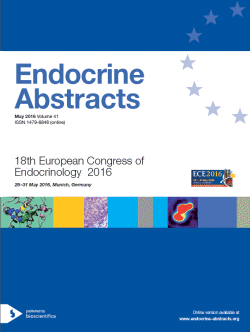Searchable abstracts of presentations at key conferences in endocrinology
Symposia
New mechanisms to induce and protect from ovarian insufficiency
ea0041s22.1 | New mechanisms to induce and protect from ovarian insufficiency | ECE2016
Genetic aspects of folliculogenesis
In humans and other mammalian species, follicular development is a complicated process. The pool of resting primordial follicles serves as the source of developing follicles and fertilizable ova for the entire length of female reproductive life. In recent years, molecular mechanisms underlying follicular activation and development have become more evident, mainly through the use of genetically modified mouse models. Recently reported mutant mouse models have shown that a syner...
ea0041s22.2 | New mechanisms to induce and protect from ovarian insufficiency | ECE2016
Cohesin ring, meiosis and primary ovarian insufficiency
Primary ovarian insufficiency is a disorder resulting in the loss of ovarian function. It is a multifactorial condition characterized by amenorrhea, estradiol deficiency and high FSH levels before the age of 40 years. Most POI cases are idiopathic. Although genes encoding factors involved in meiosis and DNA repair have been considered as obvious candidates to explain POI cases, it is only recently that whole-exome sequencing explorations have incriminated causal mutations in g...
ea0041s22.3 | New mechanisms to induce and protect from ovarian insufficiency | ECE2016
Ovarian protection during cancer treatments
Recent years have seen a dramatic rise in interest in preserving fertility in women facing treatment for cancer and other serious diseases, and fertility preservation is rapidly becoming a mainstream part of reproductive medicine. This approach, however, serves to remove oocytes or ovarian tissue before cancer treatment, rather than directly protecting the ovary itself. Some chemotherapies and radiotherapy have well known adverse effects on follicle number, although the detail...




